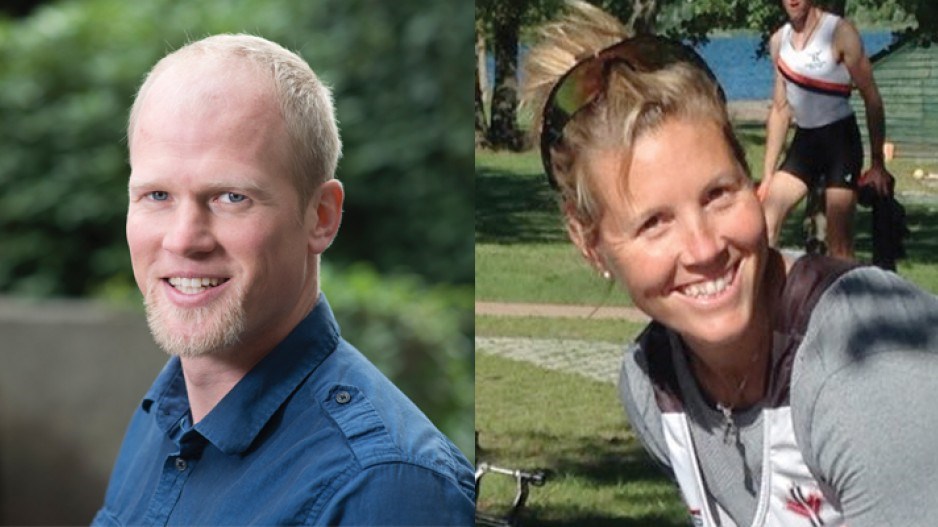Gold-medal rower Adam Kreek was living on $2,800 a month during the peak of his athletic career. To put that into perspective, as a Canadian Olympic hopeful, he was making $17.50 an hour from government and private sponsorships, which is less than the average lifeguard earns in B.C.
Athletes can’t rely solely on their talent, drive or determination to achieve success in the world of competitive sports. Money is critical to pay the considerable price tag attached to Olympic dreams. That often means relying on corporate sponsorships or government funding to eke out a living as they train in their chosen sport.
Both Kreek and fellow Olympic rower Lindsay Jennerich are very familiar with the challenges of managing athletic sponsorships while training at the highest level. Kreek, from London, Ontario, was a member of the Canadian men’s crew that won gold at the 2008 summer Olympics in Beijing, while Jennerich, a Victoria native, returned home from the 2016 Games in Rio with a silver medal in the lightweight double.
Because the Canadian rowing team didn’t have a corporate sponsorship, Kreek relied on financial support from the federal government, the Canadian Olympic Committee (COC) and private organizations, including the Canadian Athletes Now Fund, also known as CAN Fund.
Sponsorships can be distracting
Some athletes have trouble focusing on their athletic goals when private sponsorships are involved.
Kreek believes the amount he received was modest enough to maintain his focus on training, along with the team of people around him.
“Less is more, and sponsorship can be distracting,” Kreek said, looking back at the experience. “Each athlete needs to learn how to manage sponsorship, and it takes an element of maturity, a good coach, good friends and good advisers to keep you on track, because it’s really easy to go down the road of ego fulfilment.”
In Canada, the Canadian Olympic Committee awards athletes $20,000 for winning gold, $15,000 for a silver medal and $10,000 for bronze.
The money athletes receive in Canada is less than rewards offered in other countries. Often athletes can make larger, guaranteed paycheques by partnering with companies. This route, however, comes with sponsorship commitments, including appearances that can take time away from training.
While it is possible to earn a living through corporate sponsorships, it’s not for everyone, Kreek said.
He holds value in “fulfilling his ego” through achieving his Olympic goals, as opposed to looking for validation through sponsorship deals.
Athletes need to have “an honest conversation with themselves about which game they’re playing,” Kreek said. ”Are you playing the game on the field, or the one on the balance sheet?”
The tough transition away from professional sport
Regardless of where athletes get their funding, each is faced with the challenge of managing his or her money now, and for the future.
Coming off her recent success in Rio, Jennerich is faced with a new financial challenge: her sponsorship money from the government and the COC runs out at the end of 2016, which means she must find a way to earn a living as a former professional athlete.
During her training, Jennerich received $1,500 a month as a top-level carded athlete, which, simply put, is a high-level rower eligible to represent Canada at the Olympic Games or world championships.
Jennerich chose to go to university in her hometown and graduated from the University of Victoria with a degree in kinesiology debt-free – subsidized tuition being a perk of athletic sponsorship.
Where the system could use improvement, she said, is in its lack of financial planning support for athletes making the transition away from professional sport, especially for younger athletes. They often don’t face the same financial responsibilities, she said, or feel the same financial pressure as athletes who have been competing longer.
Jennerich added that younger athletes also don’t spend as much time lining up sponsorship money and learning how to save and invest it, which is an issue, “because it’s going to end very abruptly.”
While sponsorship money is enough to get by on, Jennerich said athletes need to take into consideration the years they’re not in the regular workforce, potentially earning more money, for longer. Every year they spend chasing their Olympic dream is one less year spent saving for retirement.
“Being in the sport so long made me realize that I need to be putting a good chunk of what I was earning away,” Jennerich said.
Kreek has turned his Olympic success into a profitable career. He used his geotechnical engineering background and gold-medal winnings to launch a career as a management consultant. That includes public speaking engagements that pay more than double what he was pulling in per month as a professional athlete.
He helps organizations build strong teams, manage success and change and overcome challenges – not unlike what he did during his career as an athlete.




